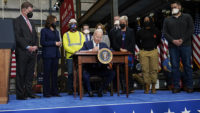Throughout his political career, Joe Biden has backed pro-union policies, and his campaign made clear that union issues will be a prominent part of his presidential agenda. Biden is a strong proponent of the Protecting the Right to Organize (PRO) Act, which would expand or overturn labor laws that address such issues as prohibiting discrimination against workers who participate in strikes, revising definitions of employee classification, preventing employees from being required to attend meetings designed to discourage union membership and expanding penalties for labor law violations.
See more ENR transition coverage on energy, the border wall and transportation.
The PRO Act was specifically cited by several construction unions when endorsing Joe Biden for president. “The long-term decline of the union movement would end if we can enact meaningful labor law reform, something that has not been accomplished in generations,” James Callahan, general president of the International Union of Operating Engineers, wrote to local unions in September, regarding Biden’s support of The PRO Act.
The bill passed the House in February, but was not taken up by the Senate. If Congress remains divided, the bill is likely to follow the same fate, however the Biden administration could enact portions of the bill without Congress, says Jim Young, senior director of congressional relations for labor, HR and safety at the Associated General Contractors of America.
“With a Republican controlled Senate, we can say with certainty that it will not pass as written,” he says. “But… a Biden administration and the Dept. of Labor can implement many of these changes through executive orders and rulemaking.”
Young expects the Dept. of Labor as well as the NLRB to push for stricter enforcement, including issues outlined under the PRO Act. He also expects a return to the Obama-era “Persuader Rule,” an executive order which requires employers to report anti-union information communicated to employees, including the activities of third-party consultants.
For now, the NLRB remains in Republican control, although Young says that could flip in August, unless the Senate holds up confirmations for vacant seats. The Senate could also stall Biden’s plans regarding cabinet appointments. The Biden campaign vowed to add a cabinet-level working group that would include representatives from labor. The group would be asked to deliver a plan in the first 100 days of the administration to increase union density and address economic inequality.
“Our read on that is that every executive action under a Biden administration will take into account the impact on unions and their ability to organize,” Young says.
After a pullback in the use of project labor agreements during the Trump administration, Mike Bellaman, president and CEO of Associated Builders and Contractors, expects PLAs to become common again under Biden. “We expect they will be looking to mandate PLAs on all work that has federal funds on it,” he says.
ABC opposes PLA mandates, arguing that it would limit competition and drive up costs. Bellaman says he also expects the Biden administration will “tighten up Davis-Bacon and make it more burdensome.”



Post a comment to this article
Report Abusive Comment